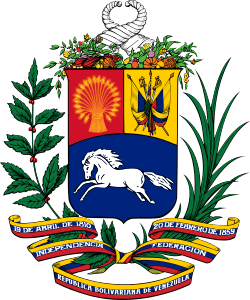Fifth Republic of Venezuela
The Fifth Republic of Venezuela (Spanish: Quinta República de Venezuela), commonly known as the Bolivarian Republic of Venezuela (Spanish: República Bolivariana de Venezuela), is the period in contemporary Venezuelan history from 1999 with the election of Hugo Chávez to the presidency and the installation of his Bolivarian Revolution, to the present day.
Bolivarian Republic of Venezuela[a]
| |
|---|---|
.svg.png) | |
| Capital and largest city | Caracas 10°30′N 66°55′W |
| Official languages | Spanishb |
| Recognized regional languages | Indigenous languages |
| Ethnic groups (2011[1]) |
|
| Religion | 71% Catholic 17% Protestant 8% Agnostic/Atheist 3% Other religion 1% No answer[2] |
| Demonym(s) | Venezuelan |
| Government | Federal dominant-party presidential republic |
| Disputed | |
| Disputed | |
| Disputed | |
| Legislature | National Assembly |
| Independence | |
• from Spain | 5 July 1811 |
• from Gran Colombia | 13 January 1830 |
• Recognized | 30 March 1845 |
| Area | |
• Total | 916,445 km2 (353,841 sq mi) (33rd) |
• Water (%) | 0.32[d] |
| Population | |
• 2016 estimate census | 31,775,371[3] (44th) |
• Density | 33.75/km2 (87.4/sq mi) (181st) |
| GDP (PPP) | 2017 estimate |
• Total | $404.109 billion[3] |
• Per capita | $12,859[3] |
| GDP (nominal) | 2017 estimate |
• Total | $251.589 billion[3] |
• Per capita | $8,004[3] |
| Gini (2013) | medium |
| HDI (2017) | high · 78th |
| Currency | Bolívar soberano[e] (VEF) |
| Time zone | UTC–4 (VET) |
| Date format | dd/mm/yyyy (CE) |
| Driving side | right |
| Calling code | +58 |
| ISO 3166 code | VE |
| Internet TLD | .ve |
| |
Venezuela has been considered the Bolivarian Republic following the adoption of the new Constitution of 1999, when the state was renamed in honor of Simón Bolívar. Since Chávez's election into office, Venezuela developed into a dominant-party system, dominated by the United Socialist Party of Venezuela and where numerous other parties exist. The 2017 Venezuelan Constituent Assembly election raised concerns of an emerging dictatorship.[6]
Under the Bolivarian government, Venezuela went from being one of the richest country in Latin America to one of the poorest.[7] Hugo Chávez's socioeconomic policies of relying on oil sales and importing goods resulted in large amounts of debt, no change to corruption in Venezuela and culminated into the crisis in Bolivarian Venezuela.[7] As a result of the crisis, the Bolivarian diaspora, the largest emigration of people in Latin America's history,[8] occurred, with over 4 million Venezuelans – about 10% of the country's population – emigrating.[9][10]
References
- "Resultado Básico del XIV Censo Nacional de Población y Vivienda 2011 (Mayo 2014)" (PDF). Ine.gov.ve. p. 29. Retrieved 8 September 2014.
- Aguire, Jesus Maria (June 2012). "Informe Sociográfico sobre la religión en Venezuela" (PDF) (in Spanish). El Centro Gumilla. Retrieved 5 April 2015.
- "Venezuela". International Monetary Fund.
- "Income Gini coefficient". United Nations Development Programme. United Nations. Retrieved 21 September 2015.
- "2018 Human Development Report" (PDF). United Nations Development Programme. 2018. Retrieved 14 September 2018.
- Casey, Nicholas; Herrero, Ana Vanessa (1 August 2017). "Jailings Raise Fears of Dictatorship in Venezuela". The New York Times. Retrieved 2 August 2017.
- "From riches to rags: Venezuela's economic crisis: The Big Picture". Al Jazeera. 14 February 2018. Retrieved 2 March 2018.
- Board, Editorial (23 February 2018). "Opinion | Latin-America's worst-ever refugee crisis: Venezuelans". The Washington Post. Retrieved 25 February 2018.
This human outflow, ... is the largest displacement of people in Latin American history
- "Gracias a las malas políticas del Gobierno bolivariano, más de 4 millones de venezolanos se han ido del país (encuesta)". La Patilla (in Spanish). 19 January 2018. Retrieved 20 January 2018.
- Forero, Juan; Protti, Tommaso (13 February 2018). "Venezuela's Misery Fuels Migration on Epic Scale". Wall Street Journal. Retrieved 13 February 2018.
.svg.png)
